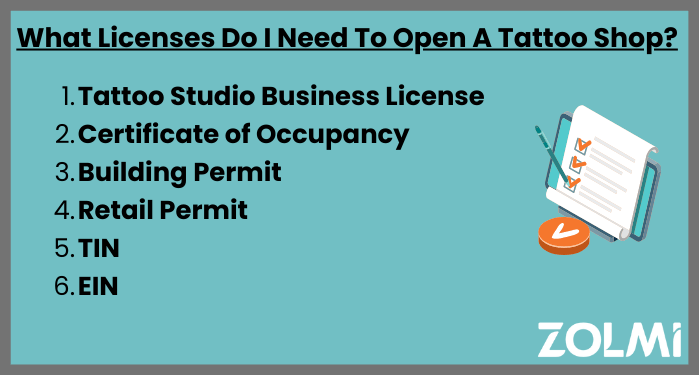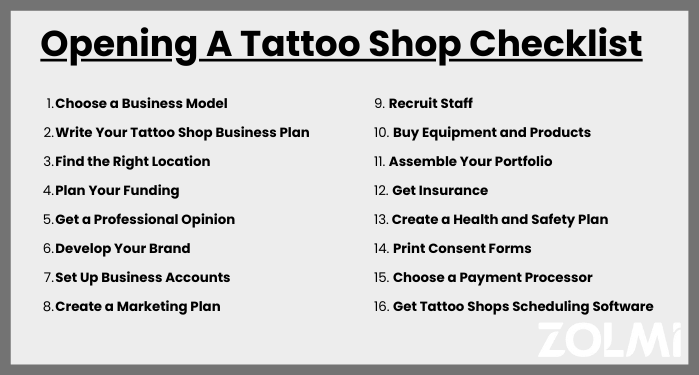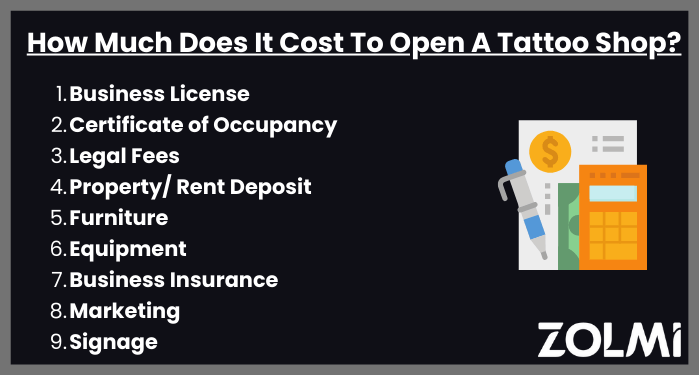How To Open A Tattoo Shop in 2024


If you’re an aspiring business owner trying to figure out how to open a tattoo shop, you’ve come to the right place. We’ve done our best to break down the steps and requirements involved.
We’ll go over the basic tattoo shop requirements, provide a business overview including costs tattoo shop owners should plan for, and give you a checklist for opening a tattoo shop.
Tattoo shops (also called a tattoo studio or tattoo parlor) is a place where professionally trained tattoo artists use specialized equipment to apply permanent (most of the time) body art to clients. Some tattoo studios also offer body piercing services.
A tattoo parlor business can take many forms, but they all have to comply with local health regulations and business license requirements- more on this later.
Some common business ideas include:
Do not miss our post on tattoo shop decor.

Now that you have an idea of your options when it comes to tattoo studios, you’re probably wondering “Okay, so what license do I need to open a tattoo shop?”
The truth is that you’ll probably need more than one. Here’s an overview of the most common requirements:
Anyone working in the tattoo industry needs to be aware of the unique professional and safety requirements before they start a tattoo business. Even if you’re a non practicing shop owner, it’s still your responsibility to ensure that your staff has the proper training.
Please note that tattoo regulations vary somewhat by state, so make sure to check local regulations for the most up-to-date information.
That said, here is what most people need to start a tattoo business:
Pro tip: There’s not one specific name for this license across the tattoo industry, so make sure to check with your state for more details or before moving states.

Whether you’re an artist getting ready to open your own studio, or simply planning on owning a tattoo shop but not tattooing, there are some steps you’ll go through along the way. Here’s a basic roadmap to help you get from square one to the grand opening.
Choose a Business Model: You’ll need to decide on both a business model and your business structure- will you join a franchise of tattoo parlors, or will you run your own business? Also, will you employ other artists, do everything yourself, or rent chairs to local tattooists?
Write Your Tattoo Shop Business Plan: Every successful business venture has something in common- a solid business plan. This acts as a roadmap for creating your business and includes your marketing plan, a description of your target market, your budget and projected cash flow, and a description of your services and products, your tattoo shop business card images.
You’ll also want to include a description of recurring expenses like staff salaries, insurance, supplies and marketing.
Pro tip: When choosing your target clientele, decide if you want to specialize in anything, especially if there’s a gap in the current local offerings. Some examples include tattoo cover ups, watercolor tattoos or portraiture.
Find the Right Location: While starting a tattoo business at home is one option, many people will search for the best place to open a tattoo shop. A lot will depend on your target clientele- do you want to be near a busy downtown area, or in a quieter neighborhood? Also, you’ll need to decide if you want to be the property owner, or rent it.
Plan Your Funding: Try to have some cash in reserve at startup (six months worth of expenses is a good number to strive for), then plan your funding- you can apply for small business loans through your bank or local credit union, and check for startup grants in your state. Make sure to budget for repayment, too.
Get a Professional Opinion: Consult a professional accountant and a lawyer about your business plan, budget and lease (before signing). This will help to ensure long-term success and double-check that everything is as it should be.
Develop Your Brand: Your brand image will influence everything from services to signage, decor and your marketing strategy. It’ll also be what brings clients in the door. You may want to create a Pinterest board to gather ideas.
Set Up Business Accounts: This is just as important as having a tattoo shop business plan. Set up a credit card and business bank account keeping personal assets and finances separate and making it easier to track expenditures. Plus, it’s important for your own sanity to separate your personal life from work- having personal and business accounts is really essential.
Create a Marketing Plan: Set up your social media pages and business website as part of your marketing efforts. Then, decide on your strategic marketing plan- how will you promote the business on social media platforms and offline?
Your friends and family can help you reach out to the local community and network, marketing your tattoo parlor to new clients on social media.
Set up your Google My Business account information with photos from your portfolio to help clients find you on opening day and leave reviews after. Tattoo studio software will help with creating automated marketing campaigns via email or SMS, and will make it easier to follow up with them, too.
Recruit Staff: Make a list of your staffing needs, then start advertising to fill them. Be sure to check everyone’s licenses, portfolios and training. You’ll need to decide if you’re willing to take apprentices who work under the direct supervision of qualified tattoo artists, too.
Buy Equipment and Products: Make a detailed list of the products you want to carry, and the tattoo equipment and supplies you’ll need. Make sure that you’ve factored these costs into your budget at startup. We’ve listed some of the basic items and costs below, to help you get started.
Assemble Your Portfolio: This includes photos of your previous work, plus basic art designs that clients can choose from. You’ll want to have examples of at least one tattoo that shows each artist’s unique style, plus samples of the work they commonly do. Images have to have your tattoo shop logo.
Get Insurance: This can be liability insurance (also called general liability insurance) and personal liability coverage. One protects against damage or loss to the business itself, and the other covers any claims made against you (which might be necessary if you’re a tattooist).
Create a Health and Safety Plan: This includes a detailed cleaning and sanitization plan, along with policies to protect a client’s safety and privacy and deal with any incidents/ injuries that occur onsite.
Print Consent Forms: Create clear consent forms that outline the risks and what to expect during a session, along with detailed care instructions that clients can understand- make sure they can take a copy of the aftercare instructions home.
Choose a Payment Processor: There are many options available, from payment apps to machines that print receipts. Take a look at what each company offers, along with their rates before you decide.
Get Tattoo Shop Software: The best tattoo studio software will not only help you optimize your admin tasks like online payment processing, tattoo shop POS, reordering your supplies, and the ability to save and manage your tattoo shop expenses.
It will help you bring new clients in with customer reviews boosting tools, SMS marketing campaigns, fast online booking page, confirmations, automated waiting lists, and suggestive add-on sales (both services and retail).

So now you’re probably wondering “How much would it cost to open a tattoo shop?”
Many professionals estimate that it can cost around $50,000 to open a tattoo salon (not including buying a shopfront). Here’s a run-down of what to expect.
Please note- costs vary a lot by location, so how much to open a tattoo shop can depend a lot on your own state or local area.
At the end of the day, questions like “How much is it to open a tattoo shop” and “What licenses will I need” really depend a lot on where you’re located- this will also determine your target clientele, the merchandise you sell and (to an extent) influence your art form.
When you’re researching how to open a tattoo shop, our best advice is to research where you’d like to start a tattoo shop at the same time. This will give you a better picture of what things will look like by the opening date.
The financing of business start-ups
https://www.sciencedirect.com/science/article/pii/S0
Graduate career‐making and business start‐up: a literature review
https://www.emerald.com/insight/content/doi/10.1108/004
Small business start-ups in the United States: Estimates of the effects of characteristics of states
https://www.jstor.org/stable/1059479